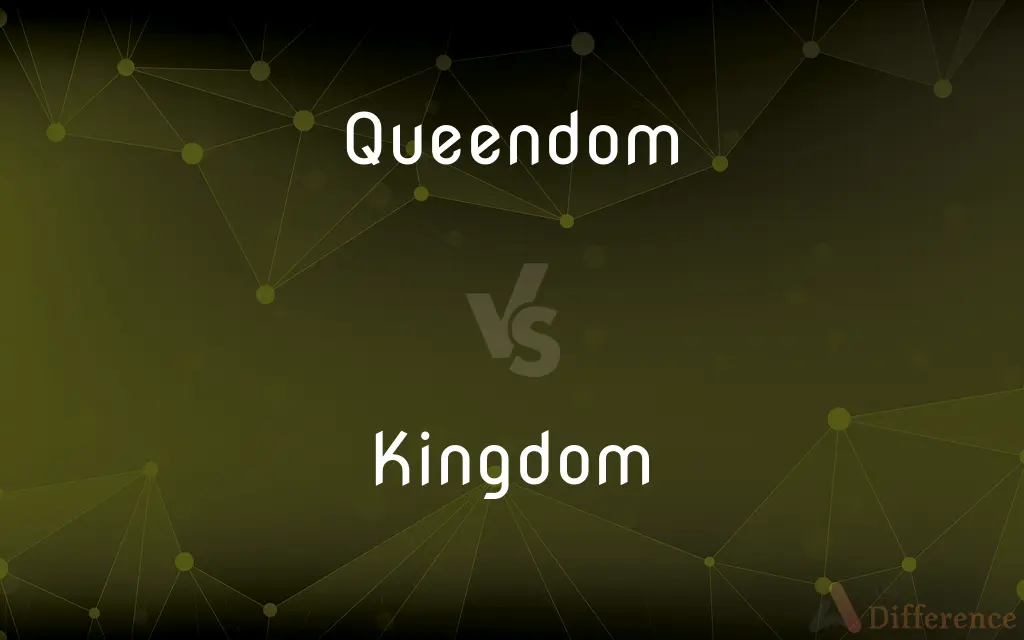Queendom vs. Kingdom — What's the Difference?
By Fiza Rafique & Urooj Arif — Updated on April 20, 2024
Queendom traditionally refers to a realm ruled by a queen, focusing on feminine leadership, whereas a kingdom is led by a king, emphasizing masculine governance.

Difference Between Queendom and Kingdom
Table of Contents
ADVERTISEMENT
Key Differences
A queendom is defined primarily by its ruler, a queen, who may either inherit her position or assume it through marriage or conquest. On the other hand, a kingdom is usually governed by a king, whose accession is similarly influenced by heredity, marriage, or military victory.
In terms of governance, queendoms are less common historically and in literature, often portrayed as embodying maternal and nurturing qualities in their leadership style. In contrast, kingdoms are more prevalent, typically associated with patriarchal structures and often depicted as having more aggressive or expansionist leadership tactics.
The cultural and societal implications of a queendom can include progressive attitudes towards gender roles and equality, with some historical queendoms recognized for advancing women’s rights and roles. Conversely, kingdoms, being more common, have a wide variety of cultural norms but generally reflect traditional male-dominated hierarchies.
The concept of a queendom can also extend into metaphorical or symbolic realms, such as in media and entertainment, where it represents empowerment or rule by women. Kingdoms, meanwhile, often symbolize established power and authority, and are a frequent motif in stories and allegories about leadership and governance.
The terminology itself, "queendom" versus "kingdom," reflects a linguistic shift towards more inclusive or gender-specific nomenclature, highlighting how language evolves with social changes. This linguistic evolution contrasts with the term "kingdom," which has been a staple in English for centuries and carries with it a weight of historical and literary precedent.
ADVERTISEMENT
Comparison Chart
Leadership
Ruled by a queen
Ruled by a king
Historical Prevalence
Less common
More common
Societal Implications
Often progressive gender roles
Often traditional hierarchies
Symbolism in Media
Female empowerment
Established power
Linguistic Evolution
Newer, gender-specific term
Older, traditional term
Compare with Definitions
Queendom
A political or territorial unit ruled by a female monarch.
The queendom prospered under her wise rule.
Kingdom
In biology, a major category in the classification of organisms, equivalent to a phylum in some taxonomies.
Fungi belong to their own kingdom, separate from plants and animals.
Queendom
A state or condition of being a powerful or influential woman.
She rose to prominence, establishing her own queendom in the industry.
Kingdom
The domain over which a monarch has governance.
His kingdom expanded across the continents.
Queendom
Used metaphorically to describe an area dominated by women.
The tech team, predominantly female, was jokingly called the queendom.
Kingdom
A realm associated with or regarded as being under the control of a particular person or thing.
In the kingdom of sports, he is a legend.
Queendom
In popular culture, a term used to denote female empowerment.
The new TV series focuses on a queendom where women lead a revolution.
Kingdom
A field or sphere in which one holds a preeminent position.
She reigned over the kingdom of blues music.
Queendom
A realm or domain where a queen's influence or authority is predominant.
Her leadership turned the organization into a queendom.
Kingdom
A country, state, or territory ruled by a king or queen.
The ancient kingdom was known for its vast wealth.
Queendom
The condition or character of a queen; queenly rule, power, or authority.
Kingdom
A country, state, or territory ruled by a king or queen
The Kingdom of the Netherlands
Queendom
A realm ruled by a queen.
She was the fairest maiden in all the queendom.
Kingdom
The spiritual reign or authority of God.
Queendom
The subjects of such a realm.
The whole queendom was outraged by the diplomatic slight.
Kingdom
Each of the three traditional divisions (animal, vegetable, and mineral) in which natural objects have conventionally been classified.
Queendom
The dominion, condition, or character of a queen.
Kingdom
A political or territorial unit ruled by a sovereign.
Kingdom
The eternal spiritual sovereignty of God or Christ.
Kingdom
The realm of this sovereignty.
Kingdom
A realm or sphere in which one thing is dominant
The kingdom of the imagination.
Kingdom
In the Linnean taxonomic system, the highest taxonomic category into which organisms are grouped, based on fundamental similarities and common ancestry. One widely used taxonomic system designates five or six such groups
Animals, plants, fungi, protists, and prokaryotes (often divided into bacteria and archaea). Other systems divide organisms into domains (eukaryotes, bacteria, and archaea) that replace or rank above kingdoms.
Kingdom
One of the three main divisions (animal, vegetable, and mineral) into which natural organisms and objects have traditionally been classified.
Kingdom
A realm having a king and/or queen as its actual or nominal sovereign.
Kingdom
A realm, region, or conceptual space where something is dominant.
The kingdom of thought
The kingdom of the dead
Kingdom
(taxonomy) A rank in the classification of organisms, below domain and above phylum; a taxon at that rank (e.g. the plant kingdom, the animal kingdom).
Kingdom
The rank, quality, state, or attributes of a king; royal authority; sovereign power; rule; dominion; monarchy.
Thy kingdom is an everlasting kingdom.
When Jehoram was risen up to the kingdom of his father, he strengthened himself.
Kingdom
The territory or country subject to a king or queen; the dominion of a monarch; the sphere in which one is king or has control.
Unto the kingdom of perpetual night.
You're welcome,Most learned reverend sir, into our kingdom.
Kingdom
An extensive scientific division distinguished by leading or ruling characteristics; a principal division; a department; as, the mineral kingdom. In modern biology, the division of life into five kingdoms is widely used for classification.
Kingdom
A domain in which something is dominant;
The untroubled kingdom of reason
A land of make-believe
The rise of the realm of cotton in the south
Kingdom
A country with a king as head of state
Kingdom
The domain ruled by a king or queen
Kingdom
A monarchy with a king or queen as head of state
Kingdom
One of seven biological categories: Monera or Protoctista or Plantae or Fungi or Animalia
Kingdom
A basic group of natural objects
Common Curiosities
What is a kingdom?
A kingdom is a geographic area ruled by a monarch, typically a king or queen.
Are queendoms as common as kingdoms historically?
Historically, kingdoms are more common than queendoms.
What is a queendom?
A queendom is a territory or state ruled by a queen.
What cultural implications does a queendom have?
Queendoms can imply more progressive attitudes towards women’s roles and gender equality.
Does the term kingdom only refer to territories ruled by a king?
While commonly ruled by a king, a kingdom can also be ruled by a queen.
Can a kingdom have a queen as its ruler?
Yes, a kingdom can have a queen as its ruler, although it is still called a kingdom.
How does a queendom differ from a kingdom in leadership?
A queendom is specifically ruled by a queen, whereas a kingdom is traditionally ruled by a king.
What symbolism does a kingdom have?
Kingdoms often symbolize established power, authority, and traditional governance structures.
Can the term queendom be used metaphorically?
Yes, queendom can also denote an area dominated or influenced significantly by women or female leadership.
How are queendoms portrayed in media?
In media, queendoms are frequently associated with themes of female empowerment and leadership.
What does a queendom symbolize in popular culture?
In popular culture, a queendom often symbolizes empowerment, specifically through female strength and leadership.
How does the concept of queendom impact societal views on leadership?
The concept of a queendom can challenge traditional gender roles and promote female leadership.
Is the term kingdom outdated in the context of modern governance?
The term kingdom is not necessarily outdated, but it carries traditional connotations that may contrast with contemporary governance values.
Why is kingdom a prevalent term in literature and history?
Kingdom is prevalent due to its long-standing use in historical and literary contexts, reflecting a common form of governance.
What is the origin of the word queendom?
Queendom is a modern term, crafted by adapting the traditional term kingdom to emphasize female rule.
Share Your Discovery

Previous Comparison
Insurgency vs. Insurrection
Next Comparison
Author vs. NarratorAuthor Spotlight
Written by
Fiza RafiqueFiza Rafique is a skilled content writer at AskDifference.com, where she meticulously refines and enhances written pieces. Drawing from her vast editorial expertise, Fiza ensures clarity, accuracy, and precision in every article. Passionate about language, she continually seeks to elevate the quality of content for readers worldwide.
Co-written by
Urooj ArifUrooj is a skilled content writer at Ask Difference, known for her exceptional ability to simplify complex topics into engaging and informative content. With a passion for research and a flair for clear, concise writing, she consistently delivers articles that resonate with our diverse audience.













































